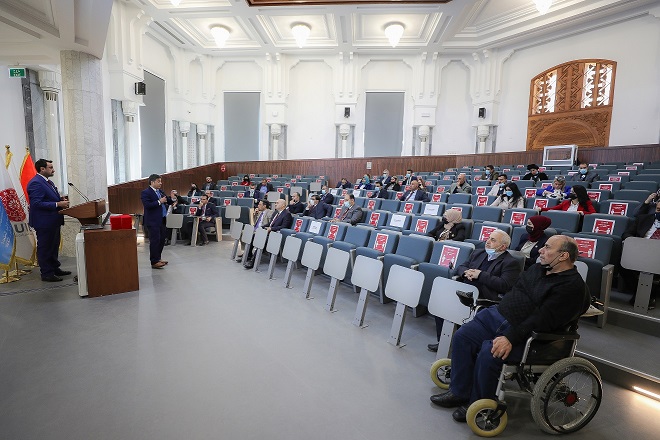On Tuesday, the 21st of December 2021, the American University of Iraq_ Baghdad (AUIB) held an inaugural conference on its campus under the title, “Education in the Time of COVID-19”, the conference discussed Education as the centerpiece of concerted efforts at confronting the pandemic by means of solidarity and innovation, perceiving it as both a “threat” and an “opportunity”. University’s Vice-President for Academic Affairs, Dr. Don Dekle, highlighted AUIB’s role in serving communities’ welfare in Iraq and beyond, offering a “neutral and balanced venue” for propagating values of “tolerance, diversity, reflection, and courage”, serving unity in the face of peril.
UNESCO’s Chief of Education at the Iraqi bureau, Mr. Khatri Santoush, thanked AUIB efforts to establish a UNESCO chair and providing the international organization with office space on the AUIB campus, which would serve to facilitate the organization of “a series of discussions” on education in Iraq and beyond, in the coming years. Santoush also announced the opening of the representative office of UNESCO inside the campus of the American University of Iraq-Baghdad in October of this year. Among the chief lessons learned from the experience with the pandemic is the “uneven effect” of the latter on high, middle, and low-income communities said Santosh. Policy advice and tools provided to governments should thus “focus on equity and inclusion”, with respect to investment in the long-term development of highly resilient educational systems, to address the challenges of “unequal access to ICT (Information and Communications Technology)”, as well as to basic power (electricity) infrastructure, among different income range communities, concluded Santosh.
Dr. Alaa Abdel-Hasan Al-Zughbi, Consultant with the Iraqi Ministry of Higher Education and Scientific Research (MOHESR), expounded on the Ministry’s e-learning strategy, including its joining of UNESCO’s “Global Education Coalition” in March 2020, and its issuance of the “E-Learning Quality Assurance Guide”, setting standards and providing performance indicators for governmental and private educational institutions’ e-learning programs, in which are currently enrolled 811,553 students in Iraq, benefiting from 486,000 open education resources, according to Al-Zughbi, who affirmed that Iraq’s “flexible blended learning model” allowed for effectiveness and safety, in the face of uncertainty and limited financial resources.
Dr. Mohammad Salman Waheeb, of the Iraqi Ministry of Health, shed light on the latter’s role in harnessing universities’ capabilities in developing diagnostic and therapeutic protocols, as well as setting relevant standards and directives. According to Waheeb, the Ministry facilitated the assembly of joint research teams, the building of epidemiological databases, and the training of a large number of medical students, in the context of combating the epidemic. Waheeb assured that the severity of the virus, in terms of morbidity and fatality rates, maybe soon end.
